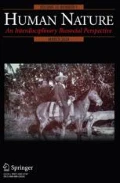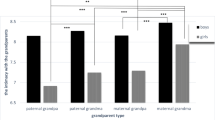Abstract
1,857 adults rated the grandparental solicitude they received in childhood. Through a simple model based on the evolutionary concepts of ontogenetically differentiated reproductive strategy and paternity confidence, an ordered discriminative pattern of grandparental caregiving was predicted and confirmed by solid main effects, based on 603 complete cases. The maternal grandmother was the most caring. Unlike prevalent gender stereotypes, she was followed by the maternal grandfather, the paternal grandmother, and the paternal grandfather. The preferential grandparental solicitude was not influenced by residential distance, grandparent age, and availability of other grandparents. A predicted higher correlation for male than for female progenitors between solicitude and phenotypic resemblance could be confirmed.
Similar content being viewed by others
References
Alexander, R. D. 1979Darwinism and Human Affairs. Seattle: University of Washington Press.
1987The Biology of Moral Systems. New York: Aldine de Gruyter.
1990 Epigenetic Rules and Darwinian Algorithms.Ethology and Sociobiology 11:241–303.
Baker, R. R., and M. A. Bellis 1989 Number of Sperm in Human Ejaculates Varies in Accordance with Sperm Competition Theory.Animal Behaviour 37:867–869.
1995Human Sperm Competition. Copulation, Masturbation and Infidelity. London: Chapman & Hall.
Bateman, A. J. 1948 Intra-sexual Selection inDrosophila.Heredity 2:349–368.
Belsky, J., L. Steinberg, and P. Draper 1991 Childhood Experience, Interpersonal Development, and Reproductive Strategy: An Evolutionary Theory of Socialization.Child Development 62:647–670.
Berger, C., and W. Schiefenhoevel 1994Adoption in Tauwema, Trobriand-Inseln. Poster Session in the Congress “Anthropologie Heute” of the Gesellschaft für Anthropologie, October 1994. Humboldt-University, Berlin, and University of Potsdam, Germany.
Bowlby, J. 1969Attachment. London: Hogarth Press.
Cohen, J. 1988Statistical Power Analysis for the Behavioral Sciences, second ed. Hillsdale, New Jersey: Lawrence Erlbaum.
Daly, M., and M. Wilson 1980 Discriminative Parental Solicitude: A Biological Perspective.Journal of Marriage and the Family 42:277–288.
1982 Whom Are Newborn Babies Said to Resemble?Ethology and Sociobiology 3:69–78.
1983Sex, Evolution, and Behavior, second ed. Belmont, California: Wadsworth.
1988 The Darwinian Psychology of Discriminative Parental Solicitude.Nebraska Symposium on Motivation (1987) 35:91–144.
Dawkins, R. 1976The Selfish Gene. Oxford: Oxford University Press.
Draper, P., and H. Harpending 1988 A Sociobiological Perspective on the Development of Human Reproductive Strategies. InSociobiological Perspectives on Human Development, K. B. MacDonald, ed. Pp. 340–372. New York: Springer.
Eisenberg, A. R. 1988 Grandchildren’s Perspectives on Relationships with Grandparents: The Influence of Gender across Generations.Sex Roles 19:205–217.
Fischer, L. R. 1983 Transition to Grandmotherhood.International Journal of Aging and Human Development 16:67–78.
1986Linked Lives: Adult Daughters and Their Mothers. New York: Harper & Row.
Hamilton, W. D. 1964 The Genetical Evolution of Social Behavior, I and II.Journal of Theoretical Biology 7:1–52.
Harris, L., et al., for the National Council on the Aging 1975The Myth and Reality of Aging in America. Washington, DC: National Council on the Aging.
Hartshorne, T. S., and G. L. Manaster 1982 The Relationship with Grandparents: Contact, Importance, Role Conceptions.International Journal of Aging and Human Development 15:233–245.
Hewlett, B. S. 1988 Sexual Selection and Paternal Investment among the Aka Pygmies. InHuman Reproductive Behavior, L. Betzig, M. Borgerhoff Mulder, and P. Turke, eds. Pp. 263–276. Cambridge: Cambridge University Press.
Hoffman, E. 1978/79 Young Adults’ Relations with Their Grandparents: An Exploratory Study.International Journal of Aging and Human Development 10:299–310.
Hrdy, S. B. 1987 Sex-biased Parental Investment among Primates and Other Mammals: A Critical Evaluation of the Trivers-Willard Hypothesis. InChild Abuse and Neglect, R. J. Gelles and J. B. Lancaster, eds. Pp. 97–147. New York: Aldine de Gruyter.
Kahana, B., and E. Kahana 1970 Grandparenthood from the Perspective of the Developing Grandchild.Developmental Psychology 3:98–105.
Kennedy, G. E. 1990 College Students’ Expectations of Grandparent and Grandchild Role Behaviors.The Gerontologist 30:43–48.
Kleining, G., and H. Moore 1968 Soziale Selbsteinstufung (SSE) [Social Self-Rating].Kölner Zeitschrift für Soziologie und Sozialpsychologie 20:502–552.
Kurland, J. A. 1979 Paternity, Mother’s Brother, and Human Sociality. InEvolutionary Biology and Human Social Behavior, N. A. Chagnon and W. Irons, eds. Pp. 145–180. North Scituate, Massachusetts: Duxbury Press.
Littlefield, C. H., and J. P. Rushton 1986 When a Child Dies: The Sociobiology of Bereavement.Journal of Personality and Social Psychology 51:797–802.
Matthews, S. H., and J. Sprey 1984 The Impact of Divorce on Grandparenthood: An Exploratory Study.The Gerontologist 24:41–47.
1985 Adolescents’ Relationships with Grandparents: An Empirical Contribution to Conceptual Clarification.Journal of Geontology 40:621–626.
Porter, R. H. 1987 Kin Recognition: Functions and Mediating Mechanisms. InSociobiology and Psychology: Ideas, Issues and Applications, C. Crawford, M. Smith, and D. Krebs, eds. Pp. 175–203. Hillsdale, New Jersey: Lawrence Erlbaum.
Porter, R. H., and M. D. Laney 1980 Attachment Theory and the Concept of Inclusive Fitness.Merrill-Palmer Quarterly 26:35–51.
Regalski, J. M., and S. J. C. Gaulin 1993 Whom Are Mexican Infants Said to Resemble? Monitoring and Fostering Paternal Confidence in the Yucatan.Ethology and Sociobiology 14:97–113.
Rossi, A. S., and P. H. Rossi 1990Of Human Bonding: Parent-child Relations across the Life Course. Hawthorne, New York: Aldine de Gruyter.
Russell, R. J. H., and P. A. Wells 1987 Estimating Paternity Confidence.Ethology and Sociobiology 8:215–220.
Scheuch, E. K., and H. Daheim 1970 Sozialprestige und soziale Schichtung [Social Prestige and Social Stratum].Kölner Zeitschrift für Soziologie und Sozialpsychologie, Special Issue 5:65–103.
Smith, M. S. 1987 Evolution and Developmental Psychology: Toward a Sociobiology of Human Development. InSociobiology and Psychology: Ideas, Issues and Applications, C. Crawford, M. Smith, and D. Krebs, eds. Pp. 225–252. Hillsdale, New Jersey: Lawrence Erlbaum.
1988 Research in Developmental Sociobiology: Parenting and Family Behavior. InSociobiological Perspectives on Human Development; K. B. MacDonald, ed. Pp. 271–292. New York: Springer.
Stearns, S. C. 1976 Life History Tactics: A Review of the Ideas.Quarterly Review of Biology 51:3–47.
Steiger, J. H. 1980 Tests for Comparing Elements of a Correlation Matrix.Psychological Bulletin 87:245–251.
Symons, D. 1979The Evolution of Human Sexuality. New York: Oxford University Press.
Tabachnik, B. G., and L. S. Fidell 1989Using Multivariate Statistics. New York: Harper Collins.
Thomas, J. L. 1989 Gender and Perceptions of Grandparenthood.International Journal of Aging and Human Development 24:269–282.
Tooby, J., and L. Cosmides 1992 The Psychological Foundations of Culture. InThe Adapted Mind, J. H. Barkow, L. Cosmides, and J. Tooby, eds. Pp. 19–136. New York: Oxford University Press.
Townsend, P. 1957The Family Life of Old People. London: Routledge and Kegan Paul.
Trivers, R. L. 1972 Parental Investment and Sexual Selection. InSexual Selection and the Descent of Man, 1871–1971, B. Campbell, ed. Pp. 136–179. Chicago: Aldine.
1985Social Evolution. Menlo Park, California: Benjamin/Cummings.
Trivers, R. L., and D. E. Willard 1973 Natural Selection of Parental Ability to Vary the Sex Ratio of Offspring.Science 179:90–91.
Voland, E. 1993Grundriss der Soziobiologie [Primer of Sociobiology]. Stuttgart, Germany: Fischer.
Williams, G. C. 1957 Pleiotropy, Natural Selection, and the Evolution of Senescence.Evolution 11:398–411.
1966Adaptation and Natural Selection: A Critique of Some Current Evolutionary Thought. Princeton, New Jersey: Princeton University Press.
Willmott, P., and M. Young 1960Family and Class in a London Suburb. London: Routledge and Kegan Paul.
Wilson, E. O. 1975Sociobiology. Cambridge, Massachusetts: Harvard University Press.
Author information
Authors and Affiliations
Corresponding author
Additional information
A shorter version of this paper with preliminary data was delivered by the first author on October 5, 1994, at the Congress “Anthropologie Heute” of the Gesellschaft für Anthropologie in Potsdam, Germany. The research was funded by the Zentrale Forschungsförderung of the Universität Gesamthochschule Kassel.
Harald A. Euler is professor of psychology at the Universität Gesamthochschule Kassel. As a Fulbright student he received his Ph.D. at Washington State University. His publications cover the psychology of learning, behavior modification, aggression, and emotion. In recent years his main research interest has been in evolutionary psychology.
Barbara Weitzel received her M.A. in ethnology and anthropology from the University of Göttingen and is currently employed as an election district assistant to a member of the Bundestag (Federal German Parliament).
Rights and permissions
About this article
Cite this article
Euler, H.A., Weitzel, B. Discriminative grandparental solicitude as reproductive strategy. Human Nature 7, 39–59 (1996). https://doi.org/10.1007/BF02733489
Received:
Accepted:
Issue Date:
DOI: https://doi.org/10.1007/BF02733489




